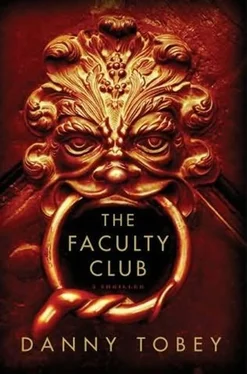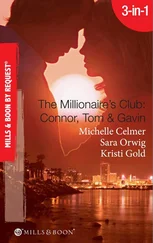We sat at a small card table and waited. Miles looked nervous. The excitement of the puzzle had worn off a bit; the cold air had let a little chill of reality back in. Miles kept scratching his beard. I had no doubt he was dreaming of his Rubik’s Cube, twisting his imaginary squares under the table. I stole a glance at Sarah. She didn’t look happy, but at least she didn’t have that how many times can you ruin my life in one week look that I kept expecting to see. Actually, when we were working the puzzle, I saw something totally different on her face, something that bothered me. She looked like she was enjoying herself. I admit a certain thrill in solving the riddle, but in her it scared me-because I was coming to the conclusion that I might care more for her than I did for myself. She hadn’t asked for this. And I had a sneaking suspicion that the moment this became a game to us-that would be the moment someone got hurt.
Miles’s phone rang. He snatched it up, looked at the caller ID, and breathed a giant sigh of relief. “It’s Chance,” he said. They spoke softly, then he closed the phone.
“He’s fine,” Miles said. “He’s heading out of town to crash with some unnamed social rejects.” Miles shrugged. “He wishes us luck.”
“Great. That’s very generous of him.”
A door opened somewhere in the building, and all three of us turned to the black curtain at the same time. Heavy footsteps came toward us. I saw Miles slide his chair back. I looked down at my hand, which was clenching itself so hard the knuckles were white. I let it relax and watched the blood return.
Then the curtain was pushed aside and a large figure came into the room. She was giant, almost as big as Miles. But where Miles looked messy and distracted, she looked like the magnificent queen of a warrior people. Her hair was a wild tangle of thick black curls, with a long elegant strand of silver in the front. Her skin was a warm caramel brown, and her eyes were green, glowing with absolute confidence, almost on fire. She wore a full-length coat dusted with snow, and a Dr. Seuss scarf, striped with a dozen shades of blue, tossed around her neck like an aviator’s. She filled the room. You couldn’t take your eyes off her.
“Everyone,” Miles said, grinning, “meet Isabella.”
“This is your store?” I asked, after we had all shaken hands.
“My father,” she said, “was a graduate student at the university. One of the first black international students. My mother”-here she gave Miles a smile-“was a local celebrity: a townie philosopher, agitator, free spirit. The first person to sell Janis Joplin records. The first person to read palms and do tarot. I was the little girl running around behind the counter in a moon dress. You wouldn’t believe the famous people who came in here as students-as a joke of course-wanting to know if the stars predicted greatness for them.” She sat and draped her arm on my chair.
“My mother and father were an improbable couple. An African man and an Irish woman, at a time when that was still scandalous. A university scholar and a red-haired hippie. The only problem was, the longer my dad was here, the more he resented his past. His new religion was economics, political theory. No matter how much they loved each other, she was obsessed with the one part of him he couldn’t wait to leave behind. She became something of an embarrassment to him. He turned into a celebrated professor, and she disappeared to San Francisco.” Isabella took in the room, seeing it through our eyes, like an alien zoo. “My mother never left me a forwarding address. But she left me this store.”
“How do you and Miles know each other?” I asked.
No one said anything, and I think they both blushed a little.
Miles leaned toward her. “No one followed you?”
“Of course not. Now would you please tell me what’s going on? Calls in the middle of the night, Miles? Make sure no one follows me? What is this?”
“Okay,” he said. He looked at Sarah and me sternly. “Ground rules. No one say a word to her about what we’re doing. We’re just asking general, hypothetical, academic questions. The less she knows, the happier I am.
“Now,” he said, turning to Isabella, “what can you tell us about voodoo?”
She slapped her forehead.
“Miles, what did I say when you asked me to marry you?”
I felt the room stop, as if all the fountains froze at once.
Miles turned bright red.
My mouth dropped open. So did Sarah’s.
“Well?” Isabella demanded.
“You said, when I grow up,” Miles mumbled.
“Sweetie, does this seem grown up to you?”
He shook his head sheepishly.
I’d never seen Miles chastened before. He lowered his head, like a puppy waiting for its punishment.
Isabella sighed, running her hands into her hair. It was midnight black, a nest of unruly, graceful ringlets. Her green eyes sparkled. She closed them, and it was like a light went off in the room. She hummed to herself. Finally, she laughed and shook her head.
“Okay, okay, my sweetheart. What do you want to know?”
Miles let out a giant sigh of relief. He gave us a goofy grin.
“Everything. Izzy, tell us everything.”
“First of all, forget every ridiculous thing you’ve ever heard about voodoo. Forget zombies. Forget voodoo dolls. Our story begins four thousand years B.H.-Before Hollywood-in the ancient civilizations of Egypt, Assyria, Ethiopia. Their accounts of the stars, the planets, the human soul-these gave birth over millennia to the religions of the African tribes: the Fons, the Igbos, the Kongos, and dozens more. The slave trade brought these ideas to the New World: to Brazil, Cuba, Haiti, Galveston, New Orleans. Religions mixed and transformed, as slaves from different tribes were integrated… if you’ll excuse the term…” Isabella leaned in and gave us a smile that was as large and majestic as she was.
“Of course, it all starts with the word itself. In the language of the Fons, Vo means ‘introspection.’ Du means ‘into the unknown.’ Voodoo is therefore the investigation of mystery. Not just of gods and heavenly bodies, but of our own souls.” Isabella drew a line with her finger across the table. “The voodoo temple is the oum’phor, held up by a central post-the solar support-and balanced by the moon, a small boat hung from the ceiling, which represents the voodoo goddess Erzulie. The top of the sun-post is the center of the sky. The bottom is the center of hell. The post itself is the wood of justice, with a whip strung from it to symbolize penitence and redemption. The post is the physical center of the temple-it is, as they say, the cosmic axis of voodoo magic. The oum’phor has many chambers: a holy of holies, and symbolic ‘tombs’ for the uninitiated-death before rebirth. On the altar are pots-de-tete, small jars that contain a bit of the soul of each person in the room.
“Everything flows from the power of the gods-the loas. You legal types may be interested to know that loa comes from the French word lois, or ‘law.’” That smile again, magnetic. She leaned in. “Ask me where the gods live.”
“Where do the gods live?”
“In the astral city Ifé, in a star that bakes at thirty thousand degrees Celsius. You’ve heard of the ceremonies. Drums. Incantations. An animal sacrifice, or sometimes a plant. The loa comes down to earth to mount a voodoo practitioner, who becomes the god’s horse. This is an act of possession, so that the gods may perform an earthly task: heal the sick, accept a sacrifice. The mounting begins with a violent struggle but ends moments later with a whimper: in a flash it’s over.”
Isabella went to a cabinet. She pulled a small object out of a box, unwrapped the felt cover, and placed it on the table.
Читать дальше












